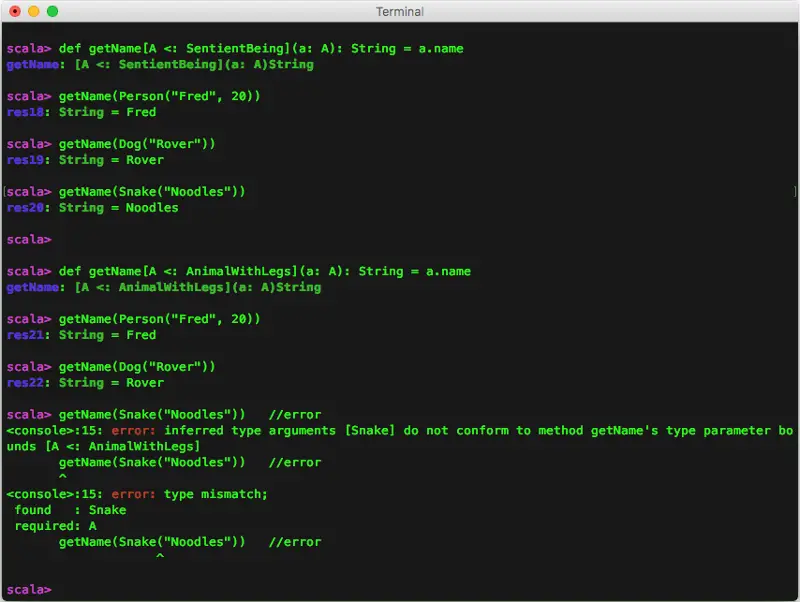In today’s installation of “how to have fun with Scala,” if you want to (a) define a Scala method that takes an input parameter, and (b) that parameter has a generic type, and (c) you further want to further declare that the parameter must extend some base type, then (d) use this “bounds” syntax:
def getName[A <: RequiredBaseType](a: A) = ???
This example can be read as, “The parameter a has the generic type A, and A must be a subtype of RequiredBaseType.”
A complete Scala bounds example
As a concrete example of how using bounds works, start with a simple base type, such as this Scala trait:
trait SentientBeing {
def name: String
}
Next, extend that base trait with a few more traits:
trait AnimalWithLegs extends SentientBeing
trait TwoLeggedAnimal extends AnimalWithLegs
trait FourLeggedAnimal extends AnimalWithLegs
Then extend those with some concrete case classes:
case class Dog(name: String) extends FourLeggedAnimal
case class Person(name: String, age: Int) extends TwoLeggedAnimal
case class Snake(name: String) extends SentientBeing
Notice that Snake extends SentientBeing, but not AnimalWithLegs.
Now that you have all the types you need, define a method that takes a parameter that has a generic type that must extend some base type. To see how everything works, define it this way the first time:
def getName[A <: SentientBeing](a: A): String = a.name
Because the base type (or “super type”) is SentientBeing, all of these calls work just fine:
getName(Person("Fred", 20))
getName(Dog("Rover"))
getName(Snake("Noodles"))
(Copy and paste those into the Scala REPL if you want to verify they work as advertised.)
Now extend AnimalWithLegs
Next, change getName so the generic type A must be a subtype of AnimalWithLegs:
def getName[A <: AnimalWithLegs](a: A): String = a.name
Now, when you run the same three method calls again, you’ll see that the Snake example fails because it doesn’t extend AnimalWithLegs:
getName(Person("Fred", 20))
getName(Dog("Rover"))
getName(Snake("Noodles")) //error
Here’s what the two sets of getName examples look like in the Scala REPL:

(Right-click that image and select “View image” to see it larger.)
The Scala “type parameter bounds” error
As shown, the second Snake example results in this error message:
scala> getName(Snake("Noodles"))
<console>:15: error: inferred type arguments [Snake] do not conform to method getName's
type parameter bounds [A <: AnimalWithLegs]
getName(Snake("Noodles"))
^
<console>:15: error: type mismatch;
found : Snake
required: A
getName(Snake("Noodles"))
^
This is because the type Snake does not extend AnimalWithLegs. (At least not in my world.)
| this post is sponsored by my books: | |||

#1 New Release |

FP Best Seller |

Learn Scala 3 |

Learn FP Fast |
Technical matters: ‘A’ has an “upper bound”
Technically what’s happening here is that I’m defining A with an “upper bound.” Bounds let you place restrictions on type parameters, and in this example I’m saying, “A must be a subtype of the type AnimalWithLegs”:
def getName[A <: AnimalWithLegs](a: A): String = a.name
More generally, this is how you say, “A must be a subtype of B”:
A <: B
I write more about this topic in, An introduction to Scala Types, so please see that article for a few more details.
A “bounds” video
If you’re interested in more information on this topic, see my free “Scala 3 Bounds” training video.